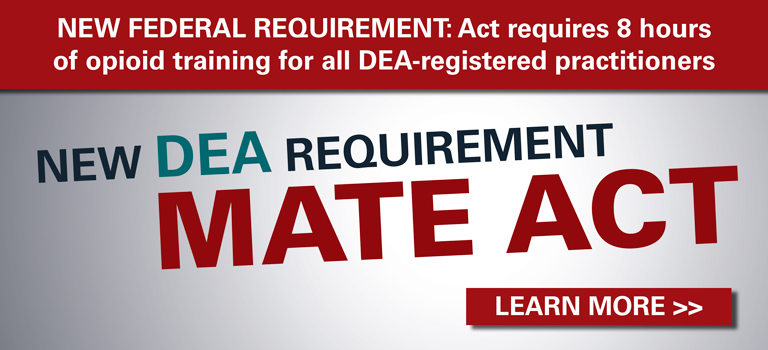
All Indiana physicians can take advantage of the continuing education courses and resources available from ISMA on the treatment of opioid use disorder (OUD).
Opioid CME Series presented by ISMA
The Opioid CME Series presented by ISMA features expert presenters who discuss best practices and other important information on caring for patients with or at risk for OUD in a variety of settings.
ISMA members get free access to all educational content on the ISMA Online mobile learning app, including the Opioid CME series.
Advanced practice registered nurses (APRNs) and physician assistants (PAs) who work with ISMA members can subscribe to content on the ISMA Online app for just $100 – a 75% discount on the regular cost of a subscription. These team members can visit
www.ismanet.org/ISMAOnlineSubscription to register by creating a new account, entering the promo code CME75OFF at checkout and selecting “Apply.”
Not a member? Click here to subscribe to all ISMA Online content through Dec. 31, 2025, for a one-time fee of $400. Or
join ISMA today and get immediate access to all the
on-demand courses in the series at no extra charge.
Opioid CME Course Fees
| Membership Status |
On-Demand CME Series |
Live CME Webinar |
| ISMA member physician |
Free |
Free |
| Nonmember physician |
$400 |
Free |
| Nonmember APRN/PA |
$100 |
Free |
ISMA Membership Dues
Compared with the cost of a nonmember subscription, it makes sense for physicians interested in the Opioid CME Series to join ISMA, the largest organization dedicated to physicians and patients in Indiana – and access the entire opioid series for free.
| 2025 Dues |
$490 |
| County Dues |
Varies by county |




ISMA is the recognized accreditor of CME for 22 health care entities in Indiana, including hospitals, medical specialty societies and the Indiana Department of Health. In the fight against opioid addiction, we remain committed to ensuring physicians are up to date on all certification requirements.
Other Resources
Visit the ISMA Prescribing Controlled Substances Resources page for more information on the topic of prescribing controlled substances.
SAMHSA’s updated Overdose Prevention and Response Toolkit provides guidance to a wide range of individuals on preventing and responding to an overdose. The toolkit also emphasizes that harm reduction and access to treatment are essential aspects of overdose prevention.
The Providers Clinical Support System (PCSS) offers a course on identifying and treating substance use disorder (SUD), to help clinical practice staff at all levels better understand SUD and patients who may be dealing with it.
The Indiana Family and Social Services Administration (FSSA) addiction treatment website includes links to treatment options and contacts. Another link leads to resources for providers. A third FSSA web resource, “Know the O Facts,” aims to eliminate the stigma surrounding opioid use disorder based on three key facts: it is a disease; there is treatment; and recovery is possible.
Developed by ISMA, the Indiana Hospital Association and the Indiana State Department of Health,
The Indiana Guidelines for the Management of Acute Pain provide an outline for the safe, appropriate and effective prescribing of self-administered medications for pain.
These guidelines are an additional resource to supplement previous work in other settings:
The
Indiana State Department of Health (ISDH) offers many
online educational resources, safety information and links to addiction services.
The
U.S. Drug Enforcement Administration released the
2017 edition of Drugs of Abuse to show and describe the most commonly abused and misused drugs. The guide also includes information on the science of drug use, the effects of each drug’s effect on the body and mind, overdose potential, origin, legal status and other factors.
The
National Center for Health Statistics provides provisional
drug overdose death counts at the national and state level to help improve data quality and visualization of current trends. The data includes: a provisional count of deaths due to drug overdose, a provisional count of drug overdose deaths involving specific drugs or drug classes, a map of the percentage of total deaths due to drug overdoses and a map of the percentage change in provisional drug overdose deaths for the current 12-month period compared with the previous year.